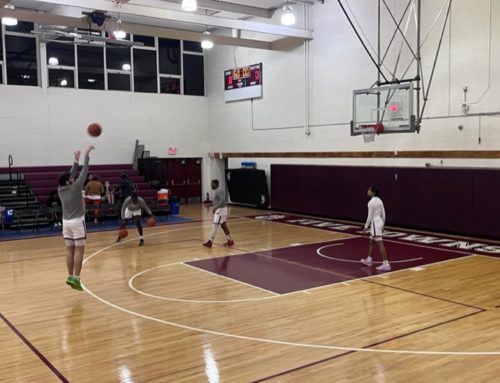
THE LATEST | CAMPUS EVENTS | NEWS | COMMENTARY | BEST OF WFTU
By Emily Angelastro
Grace Dowd works at a family-owned grocery store as a cashier. The 20-year-old minds her own business, tries to get through the day, and does her job as best as she can, particularly during the pandemic. One shift, she was taken off guard when a male customer told her to “smile,” especially considering the fact that she was wearing a mask. Something else Grace didn’t enjoy: when that same man dropped his wallet, caught it in between his legs at the counter, and asked her if she liked that he “caught it with his junk.” He then proceeded to call her an ugly little girl after she didn’t play along with his banter.
When heading into a part-time job, most people aren’t looking for problems or issues. They just need to make money. While at work, employees have to follow some kind of guidelines that force them to be nice to their customers, regardless of how they are treated. We’ve heard the phrases “the customer is always right” and “be professional” more times than we can recall, so it’s ingrained in our brains and even allows patterns of sexual harassment to form and then be brushed off. Unwanted sexual comments and harassment also occur between co-workers.
I spoke to nine different people, six women in their early 20s, one man in his 20s, a 56-year-old woman, and one 27-year-old woman who works as an Applied Behavior Analyst Therapist. I asked about their experiences and opinions on a big question: If sexual harassment in the workplace is not a secret, then why do victims of sexual harassment and their co-workers treat it like a secret?
In light of the #MeToo movement that rose in 2017, people were led to believe that there would be changes made in institutions; that the workplace would become a safer place for employees, especially young women. One woman I interviewed, a manager at another local grocery store, requested anonymity, and told me that the regulations have gotten less strict at her job. She said, “there was a change in management, so they’re more concerned with losing the workers they have than actually dealing with the situation.”
A 2017 poll from ABC News and The Washington Post found that 54 percent of American women receive “unwanted and inappropriate” sexual advances. Ninety-five percent of those who participated in the polls say that the perpetrators of the behavior and advances faced no consequences or went unpunished.
Media coverage of the movement was one of the most impactful factors in making it such a whirlwind in society. When Jodi Kantor and Megan Twohey published their story in the New York Times exposing Harvey Weinstein, the world and Hollywood were rocked with numerous women coming forward accusing Weinstein of sexual harassment and misconduct.
Andrea McLaughlin, a 56-year old Senior Project manager for a global market research company, told me, “I did, however (experience sexual harassment) in my previous job, and it was many years ago. There was a male co-worker who would call my office and home phone, disguise his voice and say profound things. This went on for a few weeks. I knew who it was and went to the office manager. They really didn’t do anything but make me sign a paper. I don’t recall what it said, but it was basically just to cover their a**. They did nothing to the guy. I’m not even sure if they spoke to him about it. It eventually stopped. This was 30-something years ago, and something like that or sexual harassment was not a big deal. I’ve had bosses call me “sweetie” and never thought anything of it. Nowadays, they would get in trouble for that.”
While McLaughlin thankfully doesn’t currently deal with instances of harassment, she still had to go through it at one point in her life. Compared to thirty years ago, regulations and awareness have starkly changed, but there is still clearly work to be done.
It’s hard for people to come forward when something of this nature happens to them at work, especially if you’re a young woman receiving an hourly wage for a job you desperately need. Dowd was asked a vile question and was harassed by a customer while at work. And one of the most frustrating parts of it all? Dowd didn’t feel comfortable telling her male manager working at the time. She told me that “had my female manager been working that day, I would’ve denied service and been able to explain.”
23-year old Genesis, who requested not to use her last name for this article, is currently a nanny and head coach for a club volleyball team. As a college student, she did a work-study at her school and experienced harassment. “I was working in the training room and was getting treatment for an injured shoulder, and a supervisor said to ‘go to the back and take your shirt off. It is what you do best.'” She told me that he was not held accountable, and he never really stopped. She says he found it funny, so it was mostly played off as a joke to him.
It appears it’s even harder for someone to come forward in a situation like this one. Genesis said that “many victims don’t come forward because it will cause more drama and make it worse for them around the workplace.” She says she’s noticed that there is more enforcement on what people can and cannot do in the workplace over the past few years.
Gloria Russini, a 24-year old from Hicksville, New York, thankfully hasn’t experienced harassment herself. But while she was a college student, she witnessed an employee in her building who had many complaints against him regarding sexual harassment. This case had a more satisfying ending as more and more girls came forward as the story spread through word of mouth. “He was gone within a few weeks,” she said. I then asked her why she thinks victims would be reluctant to speak out in that kind of situation. “I can’t speak for the women who came forward, but I think being reluctant has a lot to do with putting a person’s job at risk. Maybe they think ‘it’s not a big deal and I’m being dramatic.’”
Many young women may have this mindset that their reactions could be taken as dramatic or problematic employees when all they want is to feel safe and comfortable at their workplace. It’s more intimidating when management doesn’t seem to be proactively looking out for workplace issues. In Dowd’s case, she seemed to be more comfortable working with her female manager and believed that she was safer when they were working at the same time, or at least believed that she would handle the situation better than a male manager.
There are some exceptions to having a manager who you’d be afraid to come to if something were to arise. To Sindy Nieto, an assistant manager at Pandora, it is in her best interest to portray herself as someone who takes anything reported to her seriously.
“I definitely always watch over associates and even customers that would want to sexually harass the girls. I would definitely report it to the owners and to the store manager so that everyone is aware of what is going on.” The 22-year old doesn’t just stop at what she’s directly told, which, unfortunately, many employers do. “Now, if they don’t report it to me, I would have to watch and keep my eyes on them even more! I will definitely speak to the person who is being harassed and tell them that it’s okay to tell me what’s going on because at that point, I have to know. It can definitely be dangerous.”
The anonymous grocery store manager I spoke with is unfortunately unable to do anything unless things are reported to her. This 21-year-old woman has worked at this one store for six years and said she’d seen her fair share of people being harassed, yet, it’s not particularly dealt with by management.
“I witness it all the time. There are a few people who have been there forever that continuously do it to everyone.” I asked her, as a manager, if she thinks the responsibility essentially falls in the hands of the victim to make anything happen if someone is targeting them:
“So, technically, I’m not supposed to do anything unless I get a complaint. So, if I see sexual harassment… they kind of want you to like…I mean, you can separate people, but they don’t want it to be something you have to report unless it’s brought to your attention by another worker. You assume it’s fine unless you’re told otherwise.” Along with having to follow these rules, she’s also dealt with her own hardships with harassment at work.
“The only experience I had was handled pretty properly. No one was fired or anything, but they transferred someone. But I feel like that only happened because it was me, and I was really close with management and everything. Whereas the same thing has happened to other people, but nothing is done about it. There’s an overnight worker who would be very creepy towards me, and I let it go for a long time. But finally, it got way too far, so I went to my manager, and I told her everything, and we went through the process, and he was transferred to a different store but still works for the company.” I asked her if anyone noticed the harassment and what she thought could’ve been done to help her.
“People definitely saw it and didn’t do anything. Maybe like… send the creepy man that’s 50 back to his department instead of letting him hang out with me at the front,” she said with a bitter laugh.
Elyssa DiCostanzo, a 23-year old cashier, was the third separate grocery store employee I interviewed. She told me about a co-worker who was repeatedly inappropriate towards her. “One time, I was helping out in the produce department, and this guy, I don’t know if he was the produce manager or something, and he was critiquing me and just being an a** about the way I was doing it. Then I was doing it another day, and that time he was like, ‘Oh, that’s so good I could kiss you.'”
However, she has a vivid memory of a previous conversation with a manager that held her back from taking any action. “I remember them saying something like ‘when someone is threatening to call HR on someone, I really just see it as someone threatening their job.’ So, I always keep it in the back of my mind.” DiCostanzo recounted the events and how that single conversation stuck in the back of her mind and added, “It takes a lot for me to feel uncomfortable, and I always give people the benefit of doubt. But he kept saying things that were really creepy, and I was telling some of my older co-workers, and they were telling me I should call HR. And I just didn’t feel comfortable doing that because, what, he’s gonna get transferred because of me and then people are going to start saying things? It’s such a stigma, and I shouldn’t feel ashamed of feeling uncomfortable if I am, but you just feel bad.”
Unfortunately, there can be shame associated with coming forward or just being a victim in general. The dread people feel doesn’t only stem from what they’ve been through but could be from the toxic social norms that are unfortunately still alive.
Although many of the recent public cases around sexual harassment involve young women, that doesn’t mean that men or gender non-conforming folks are safe from harassment. A 26-year-old man, who also requested anonymity, told me about his experiences. He described one of his past jobs at a sports store. Though he hasn’t witnessed any harassment towards anyone at his work, he did mention that his fellow employees consisted of pretty much an all-male demographic:
“So at a past job, there weren’t very many females who worked there, so it was kind of like a frat house/locker room type vibe. So, there was some hazing that used to go on. It never happened to me and I never witnessed it, but I have heard instances of hazing with new employees.”
I asked him to elaborate on what these employees would do to the newer ones.
“Someone would be like, ‘Hey, can you help this person out with something?’ Then they’d go to the back, and they’d be exposed,” he said uncomfortably.
It is noteworthy that the wording was changed from “harassment” to “hazing” because the victims were male. Whether people are aware of it or not, the double standard is incredibly damaging. Vulnerability is seen as a weakness to many of the men who are harassed due to what they constantly hear from their peers and others surrounding them. The double standard causes people to water down what they’ve been through and possibly lead to trauma that will stick with them for life.
I spoke to a 27-year old ABA Therapist who has previously worked as a Care Manager for adults with mental illnesses. Her role was to provide extra support throughout their journey towards independence. She worked with clients at her previous job who have dealt with sexual harassment in their workplace. I asked her if she thinks the rules have gotten stricter or are taken more seriously within recent years, and she didn’t think so. She said that the mandatory trainings are shown more so as “something you need to do” to work somewhere, rather than something that people should want to learn to know the different types of sexual harassment that are out there. I asked her professional insight on why she thinks victims are afraid to speak up:
“In my opinion, these women were reluctant to come forward because they were frightened that they would be demoted, relocated, fired, not taken seriously, or lose their current level of pay. They have also stated that the individuals who would need to be informed of this would not take the accusations seriously, and nothing would get done.”
She explained how a manager should react when an employee comes to them with a complaint:
“When I have had this issue brought to my attention, my first suggestion was to report the perpetrator to their workplace and police and ensure their environment was safe. In my opinion, I believe people would file this as a lawsuit rather than just report it to HR because being sexually harassed can cause so much harm to someone mentally than people truly know, and it may offer peace of mind knowing the perpetrator is being handled by the law. It may also help the victim feel they worked to ensure the perpetrator could not do that to someone else as well.”
“Trapped,” “forced to,” “secret,” “have to,” “afraid;” when describing the experience of harassment and the act of actually coming forward, these words are synonymous to both categories. From my anonymous source: “I have to be nice to everyone…including really, really horrible people.” DiCostanzo added, “It’s not like I can flip out on a co-worker. People do, but I personally just can’t. There are times where you feel trapped in a way. Sometimes when you speak up, then someone will be like, ‘WOAH, I didn’t mean it like that,’ and they try to make you feel stupid.”
That dread, that fear, that shame, and that frustration exist in every aspect of the process which my sources described.
The bravery for these people to come forward and speak to me, even anonymously, gave me hope that change will come, and there shouldn’t have to be an added layer of that shame or fear that might already exist. Genesis summed it up, “Many victims feel like they are too small and insignificant and that saying something will do nothing in their favor. The people who do are brave, and having a supportive, empowering environment helps people come forward.”



